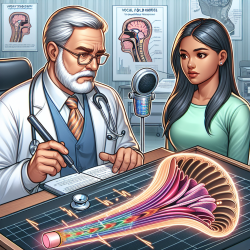As online therapy continues to grow in importance, especially in educational settings, staying abreast of the latest research is crucial for practitioners. One such study, "Charged-particle distributions in pp interactions at $$\sqrt{s}=8 \mathrm {\, TeV}$$ measured with the ATLAS detector," offers intriguing insights that can be applied to improve skills in online therapy.
Understanding the Research
The study, conducted by Aad et al. (2016), focuses on measuring the distributions of charged particles produced in proton-proton collisions. Although the research is rooted in experimental physics, its methodologies and outcomes can be translated into the field of online therapy, particularly in special education.
Key Takeaways for Online Therapy Practitioners
Here are some actionable insights from the research that can help improve your skills in online therapy:
- Data-Driven Decision Making: The research emphasizes the importance of data collection and analysis. In online therapy, collecting data on student progress and therapy outcomes can provide valuable insights that guide your approach.
- Systematic Approaches: The structured methodology used in the study can be mirrored in online therapy sessions. Implementing a systematic approach to session planning and execution can enhance the effectiveness of therapy.
- Continuous Monitoring: Just as the study continuously monitored particle distributions, therapists should regularly monitor and adjust their strategies based on real-time feedback and progress tracking.
Encouraging Further Research
The study by Aad et al. (2016) highlights the importance of continuous research and adaptation. Online therapy practitioners should be encouraged to engage in further research to keep up with the evolving needs of their students and the latest technological advancements.
Practical Implementation
To implement these insights, consider the following steps:
- Utilize Data Analytics: Invest in tools that allow you to collect and analyze data on student engagement and progress.
- Adopt a Structured Approach: Develop a consistent framework for your therapy sessions, including clear objectives and measurable outcomes.
- Engage in Continuous Learning: Stay updated with the latest research in both online therapy and related fields like experimental physics, which can offer innovative approaches to problem-solving.
By integrating these practices into your online therapy sessions, you can enhance your effectiveness and better support your students' needs.
To read the original research paper, please follow this link: Charged-particle distributions in pp interactions at $$\sqrt{s}=8 \mathrm {\, TeV}$$










